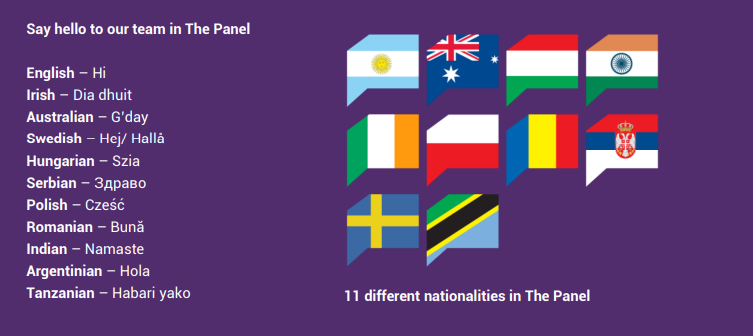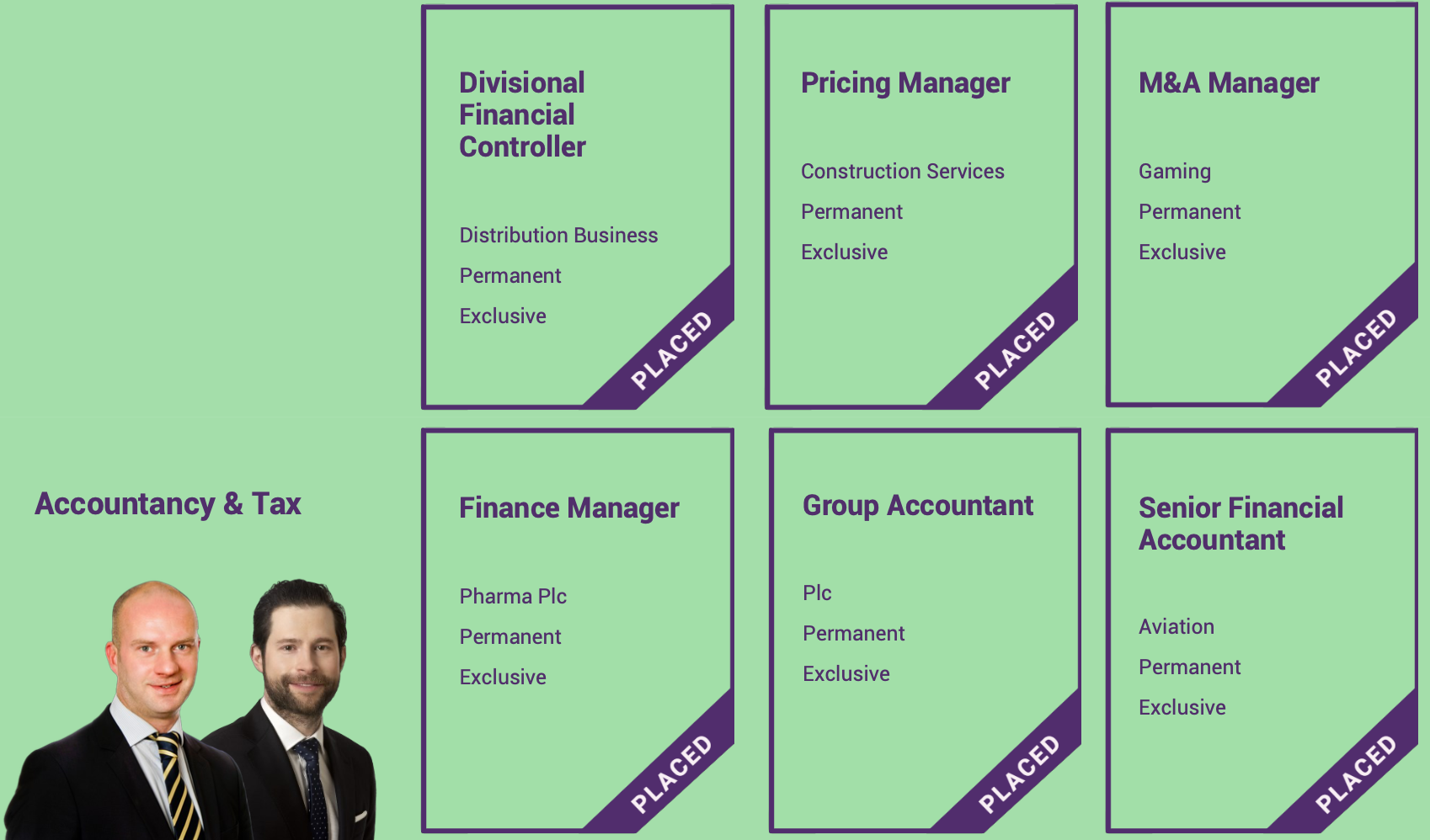EXECUTIVE
accountancy & treasury
salary guide
2023
accountancy & treasury
salary guide 2023
CFOs to Accounts Staff and Treasury
Industry & Financial Services
Author: Paul McArdle, Joint Managing Partner
Download the 2023 salary guideView the 2022 salary guideView all salary guidesoverview
2022 was another strong year for accountants as demand across all sectors maintained the 2021 levels. Where 2021 started slowly, and then recovered, 2022 continued to be a candidate-led market.
Clients are now more open about where candidates work because they have to be. For many of our candidates, the hybrid working model is of the most interest. We are educating clients who expect employees to be based full-time in the office, that the pool of talent they can fish from is restricted.
Hybrid working:
Accountancy is a profession that lends itself to hybrid/remote working. That said, a lot more of our finance candidates are happy to work in the office, just not all the time. For newly and recently qualified accountants, they are looking to work in the office. They like socialising, and the officeenvironment gives them more opportunity to meet people. More importantly, they can receive excellent on-the-job mentoring, which is invaluable for their career development.
Travel:
With travel restrictions being removed, we are seeing a significant migration of new and recently qualified accountants to Australia and Canada and other global locations. This has made roles at this level much more difficult to recruit for as the candidate supply is restricted.
The Finance Manager/Financial Controller levels are still robust, with plenty of opportunities and a better candidate supply. Salaries have remained strong, and while still a candidate-led market, the pace of the increase in salaries has slowed acrossthe board.
Counteroffers:
Counteroffers are very prevalent at all salary levels. Many employers prefer to increase the salaries of their employees as opposed to hiring fresh talent.
It is worth noting that the counteroffered employees tend to move within 12 months anyhow, as many of the reasons they look to move for are not solely finance based.
The CFO market:
The CFO market has sustained the increase in demand for talent at this level from late 2021. Therate of salary growth has slowed, but salaries are
still rising. CFO candidates are now looking atequity participation or LTIPs (Long Term Incentive Plans) more and more. Private equity-backed businesses are very open to locking in finance talent in the longer term. Often the hardest part ofthe salary package negotiation is around the scale
of the equity reward and the timing of how/when the reward is triggered.
In public companies, there is a well-worn path of equity rewards in the shape of share/share options or other derivations. Private companies often do not want to dilute equity and use LTIP/ profit share mechanisms to reward loyalty. Interestingly, the role of the CFO is usually to help design the appropriate reward structure
Market Sentiment Survey 2023
In January 2023, we surveyed both accountancy and treasury professionals, to get their views on a number of different topics.
This comprehensive sentiment survey was completed by over 800 respondents. Below are the answers to the overall survey. In the subsequent sections, we compare the overall survey results with those of the respondents at a particular salary level.
We also gave respondents a “free text” option. The highlighted quotes are of the respondents themselves, unedited.
Respondents were asked to pick all the statements that applied to them. One in five have worked the same way they always have, COVID or no COVID.

Interestingly close to 40% believe they are doing their jobs as effectively as ever, despite consciously putting in fewer hours. This figure surprised us in two ways, both in how high the figure was and also that respondents were so open about this choice.
In tandem with this, the fact that one-third of the respondents prioritise themselves and their families more makes sense. In The Panel, these topics are discussed with candidates more than ever. Pre- COVID, they were barely an issue. It is one of the most significant sea changes in candidate attitudes and is a direct result of their experiences in the pandemic. The embracing of smart technology and hybrid working is apparent. However, we felt the figures of 55%
each respectively in both cases were lower than we expected. The 2% of respondents who chose to work in the office more is consistent with our experience of the talent market at this level.
“For C-suite executives, the acceptance of hybrid and virtual meetings as a norm now has been transformative in terms of work/life balance.”
“There simply are not enough supports for women and families in the workplace. Working from home has just increased women’s workload further”.
“My own personal circumstances dictate that I work better in the office due to small kids at home. As time passes, I will adopt a hybrid approach of 1-2 days and expect this to be facilitated. I anticipate that this model will prevail for roles that are not customer facing”.
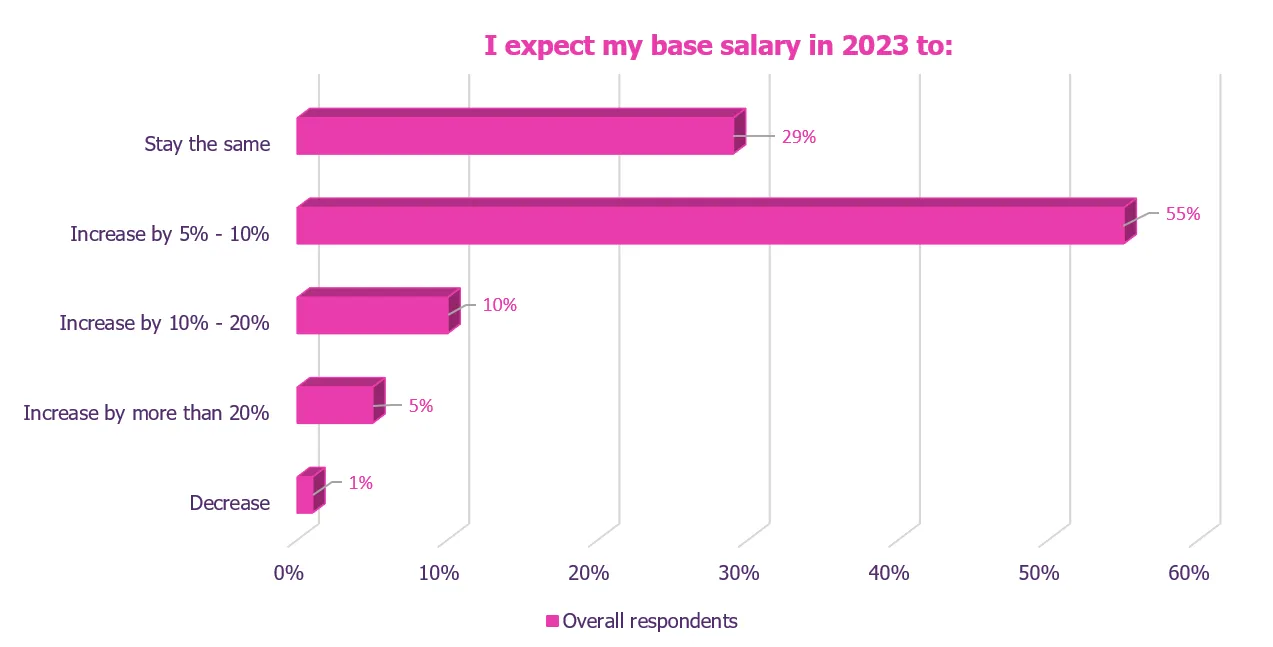
While a third of respondents expect their salary to stay the same, 70% expect a pay rise in 2023, most of them to 10%. 1% expect a decrease in their salaries. This is very encouraging.
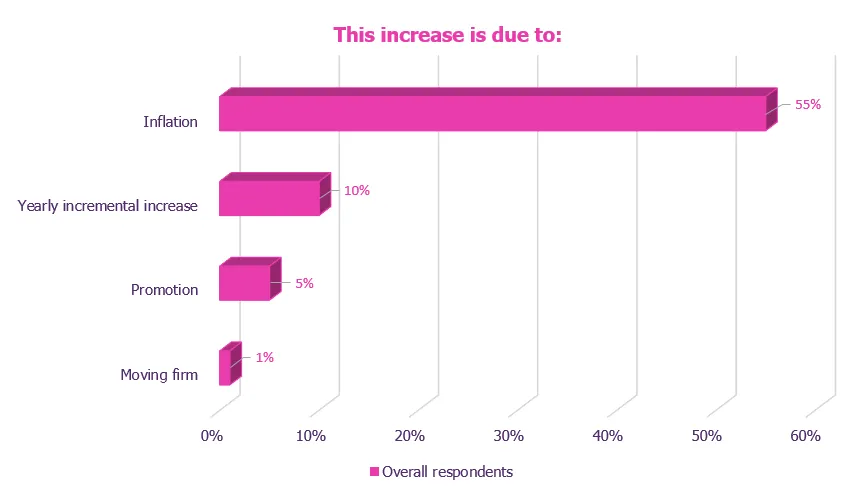
An interesting mix here with inflation being a key driver of the salary increases as already agreed on incremental increases.
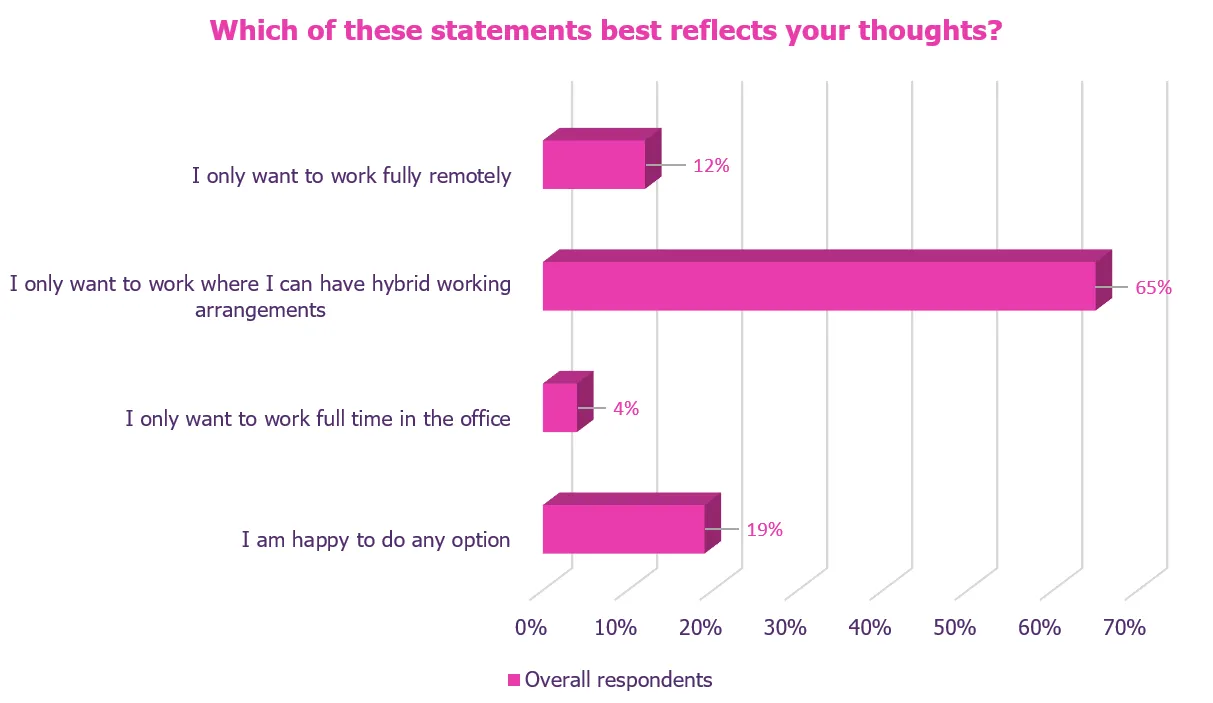
12%is higher than we expected for those who want to work remotely only, and the 4%figure for working solely in the office is consistent with other surveys we did.
84% of respondents are happy to work hybrid or to go with the flow.
“Working from home is far more productive for me and all my colleagues. It is the future”.
“Very clear from my work with clients in the city centre that a majority favours working from home. However, I feel managing my team on-site delivers more control and collaboration”.
“Employers have to offer Hybrid if they want to attract talented candidates”.
“Rigidity in my current workplace is part of the reason I wish to change role”.
“The harm of companies demanding or allowing people to work full time at home is not discussed and needs to be”.
“Do people feel more/less/same connected to their colleagues with increased WFH”?
“Time for reality to return and people to get back to the desk and back to work”.
“I would love to be fully remote, and I would only consider moving roles to a company that has a generous hybrid arrangement. Work life balance has become very important”.
“The fact that more people are now fully vaccinated for COVID, I think we run the risk of getting cabin fever if working only from home. I enjoy the interaction one gets from working in an office environment”.
“Working in a senior finance role – hybrid is fundamental to this. Since Covid I have returned to full time from part time because of the increased flexibility now offered”.
“Taxation should be considered with hybrid working. If can spend more time in country with lower marginal rate, it has a material impact”.
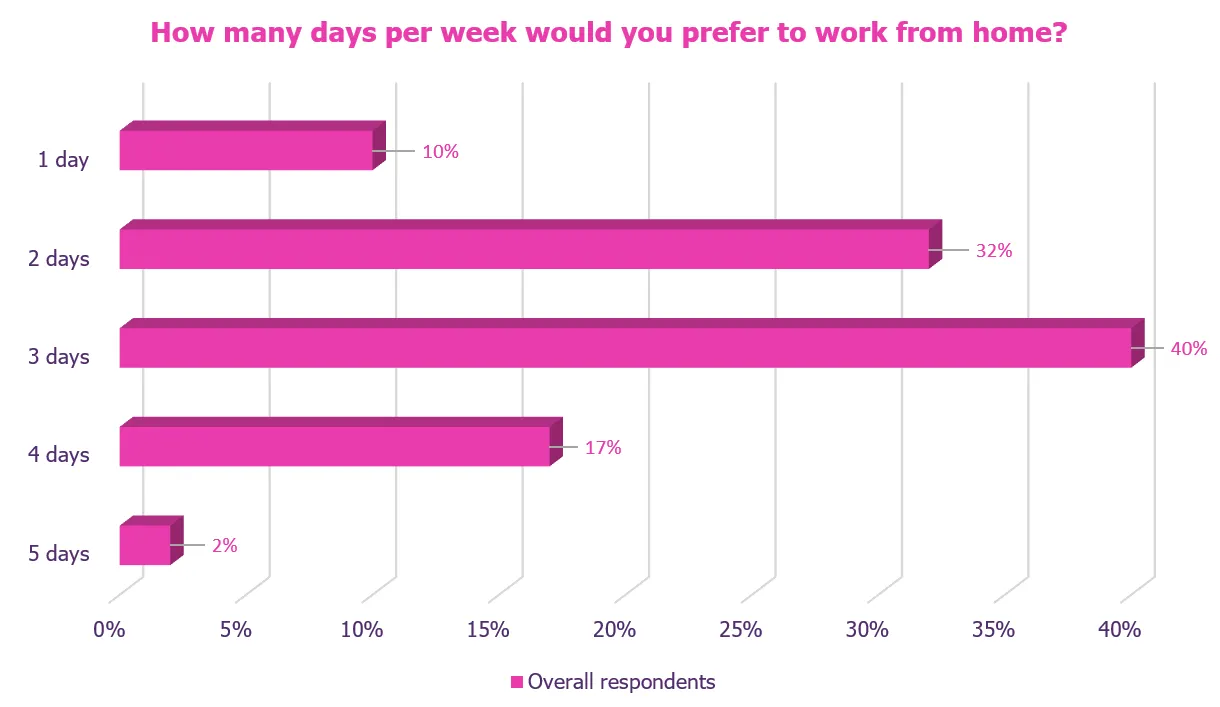
The results of this are fascinating. If you take the wanting to work entirely remotely figure of 12%, the five days working from home of 2% doesn’t seem to tally. Working 4 or 5 days from home at 19% seems to be more accurate.
No surprise that the two-day or three-day options were the most popular.

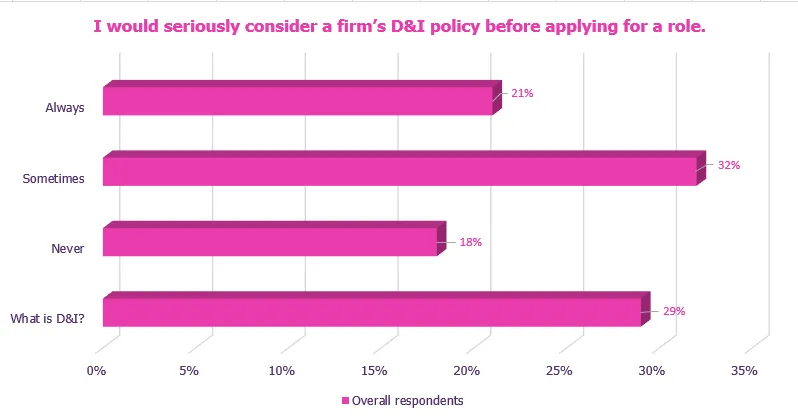
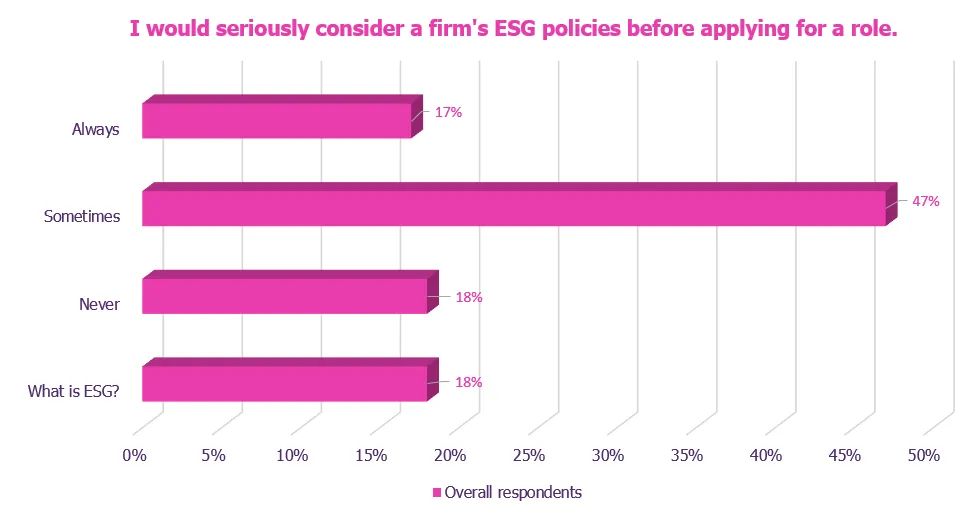
We have grouped the answers to these two questions together as D&I (Diversity and Inclusion) and ESG (Environmental Social Governance) are hot topics. Roughly one in five candidates will look at both policies as part of their due diligence of new roles, which is lower than we thought.
Interestingly, ESG seems to be more “front of mind”, with over 60% considering an employer’s ESG policies. This compares to half the candidates considering a company’s D&I policies.
ESG is becoming more prevalent as a business metric. In The Panel, we find that our more prominent clients, especially in financial services, are very ESG aware. That over 60% of candidates consider ESGas part of their career decision-making process is encouraging.
Employers who embrace ESG and promote their ESG policies have another string to their bow regarding talent attraction.
“My answer to the ESG question does not diminish the importance of ESG in my own mind or in the businesses I am part of. Simply that ESG strategy is not one that I take into account when evaluating roles”.
“Generally in life and employment my carbon footprint is something I will consider.”

Three people out of every ten feel that the increase in costs will affect their career choices. When we speak to candidates about roles, their prospective commute is high on their list of considerations.
We were also fascinated to see how a significant rise in energy costs would affect the mindset of an employee. You could make arguments that people would rather their employer keeps them warm during the working day in the office as opposed to them having their heating on at home. For this reason, we assumed more people would want to return to the office.
Initially, we had thought that energy prices going up would have more of an effect on the cost of commuting. The counterargument is that more people would choose to work from home.
As it turns out, it does not seem to be a big issue at all, with 80% saying it will make no difference where they physically work.
“Life is a lot longer than a tough winter – for those of us at a certain age – recession and instability are not new – it’s a time for the younger less resilient to learn from their older colleagues”.
“Impending recession due to the energy crisis is likely to lead in a slowdown in suitable roles becoming available.”
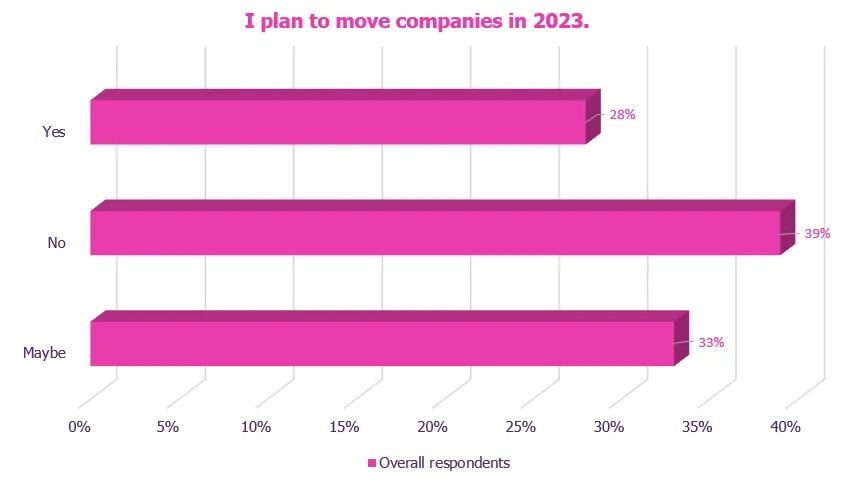
40% of respondents are staying put, 30% are open to moving, and a third of respondents are keeping their options open.
Respondents’ reasons for looking to move include:
- Career progression.
- Looking for a better salary package.
- Wanting to change their working arrangements to hybrid.
- New challenge.
- Their contract is coming to an end.
- Don’t like the management!
- A change of location.
- Company closure/layoffs.
- Travel.
- Escaping a toxic work environment.
- Workload is too much.
- Changing industry.
Lots of different reasons. Some people will move of their own volition, while others do not have the
luxury of that choice.
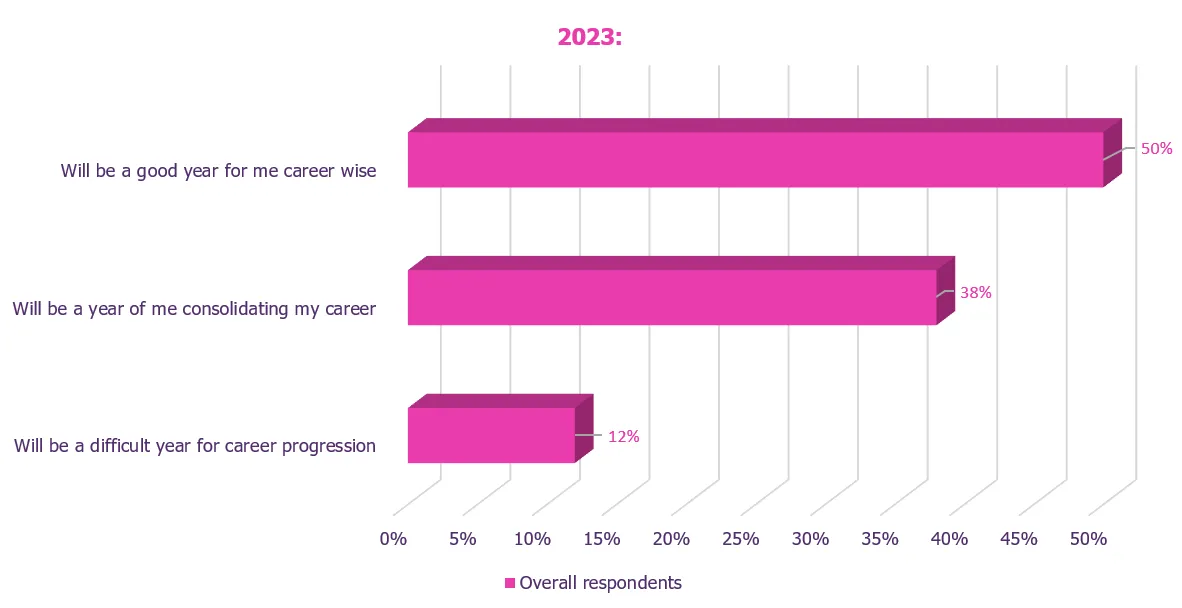
This is always a great barometer of sentiment. That half the respondents believe 2023 will be a good year career-wise is encouraging. We expected a higher figure than 38% of respondents looking to consolidate their careers, and the 12% of respondents who believe 2023 will be difficult for them is lower than we expected.
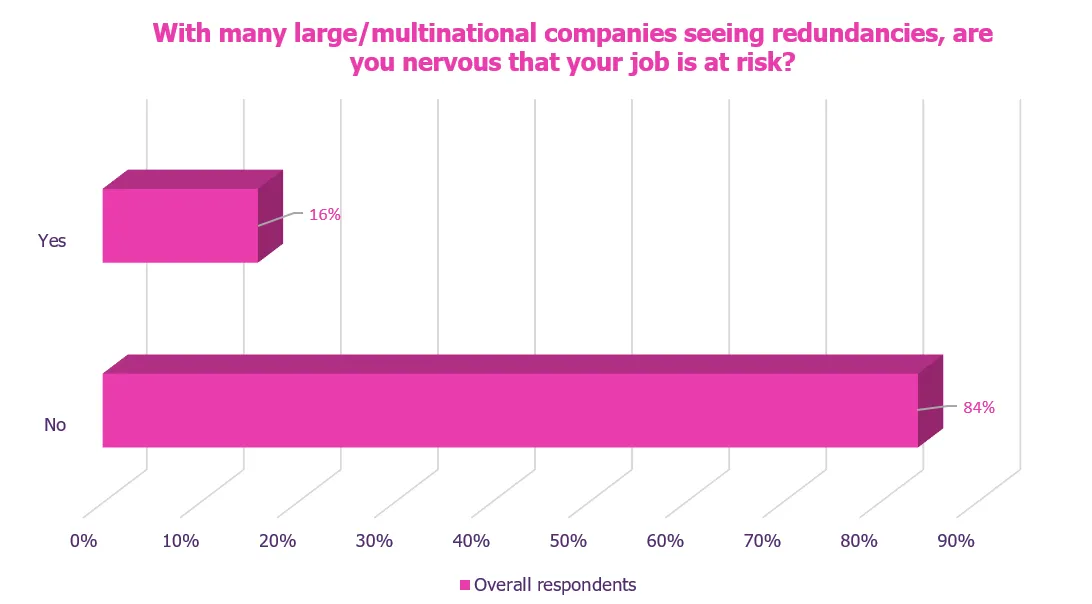
With the news cycle being dominated by layoffs in technology companies, the 16% figure seems low.
The effects of these layoffs seem to be overplayed, based on the 84%of respondents who feel their jobs are secure.
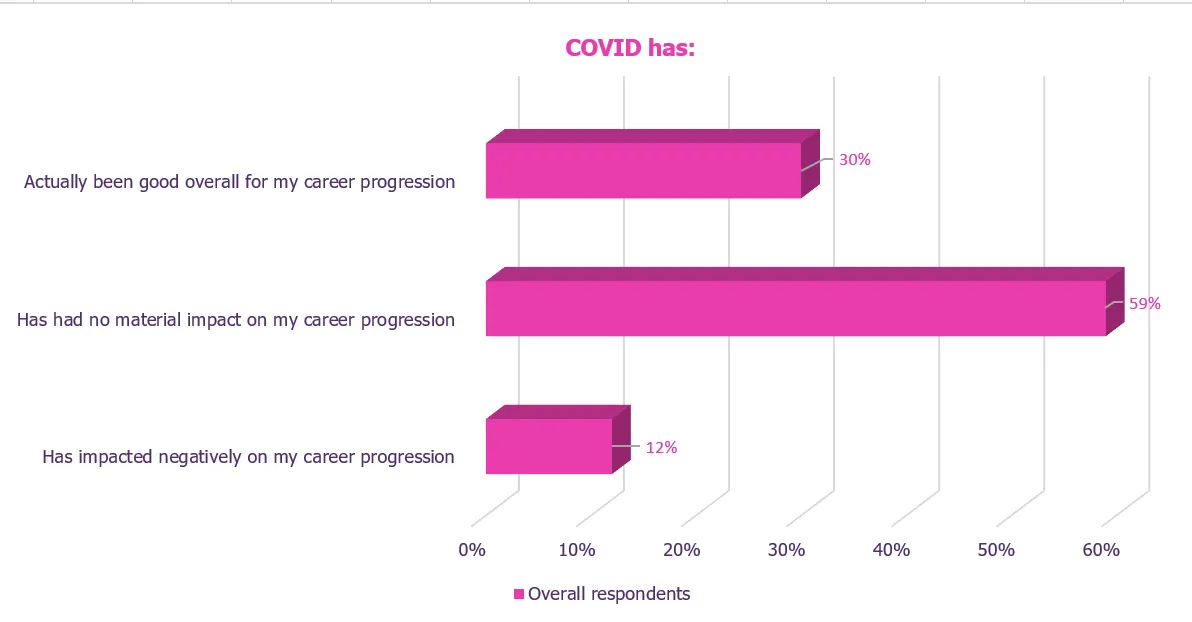
These figures suggest that normality is returning to the market. 12% is a low figure for those negatively impacted by the pandemic. Hopefully this number will keep falling.
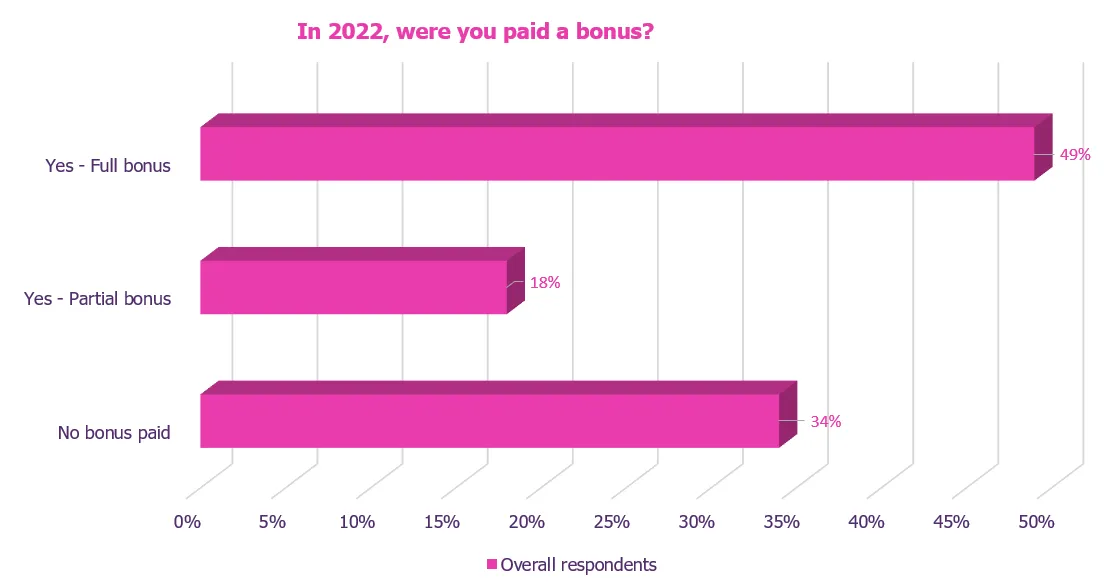
Bonuses are always a good barometer of the health of the employment market. That nearly 70 %of respondents got a bonus of some sort is encouraging.
That one-in-three respondents got no bonus is a higher figure than we expected. In a talent-short market, it is particularly surprising.
The CFO Market

The CFO/Finance Director market in 2022 was robust. There were more opportunities in the market for senior finance candidates than there have been for several years. A lot of this is down to pent-up demand from COVID. People did not move during the worst of the pandemic, mainly because they had nowhere to go.
The government support scheme kept many businesses going. In our opinion, the government has not received the acknowledgement it should have received for the scheme. It has had a material and positive effect on the economy, and secured jobs that otherwise would have been lost.
Private equity backed opportunities:
As senior finance candidates decided to look for new roles, opportunities were opening up. In The Panel, we dealt with a number of private equity backed companies. They were all looking for executive finance talent that could scale their investee companies for sale.
These roles came with good base salaries and add-ons. The biggest attraction was the equity piece. The roles came with Long Term Incentive Plans (LTIPs) that were set up to materially reward the candidate as and when a liquidity event occurs.
Senior technology finance roles:
The job cuts in technology companies are predominately in sales, support and talent acquisition. We have not had an influx of senior finance candidates from tech. as of yet. We have anecdotally heard of job offers for finance roles being pulled.
Anyone from senior finance roles in technology registering with The Panel are doing so for two reasons: their own career advancement and/or because the culture they are working in has been impacted adversely by their colleagues being made redundant.
SMEs confident:
We are seeing more mid-size companies (t/o €20m plus), usually owner-managed, looking to hire senior finance talent. There is confidence with entrepreneurs that is at odds with the news cycle on rising enegy costs, tech. layoffs, recession etc. Most of our clients find that acquiring talent is as challenging as ever.
Interestingly, we are seeing an increase in senior finance roles outside Dublin. We are sourcing finance talent that either lives locally or is looking to return to a location they are originally from.
Salaries:
The salary levels for CFOs/FDs are rising, but we believe at a slower rate. Recent assignments we have delivered on have seen our clients getting strong finance talent from their industry sector. At this level, we are seeing more candidate availability than last year, hence the lower rise in salaries and the availability of direct sectoral talent.
Holidays/Working Arrangements:
2023:
It is early days, but the market is on par with 2022. The volume of opportunities is similar, and the availability of talent is a little better. Senior candidates can afford to be choosy. However, our clients have more choices than they did in early 2022. We believe this is down to candidates being more confident in maing a move, increasing candidate supply on the market.
Here we compare the responses of CFOs/FDs to those from the overall survey.
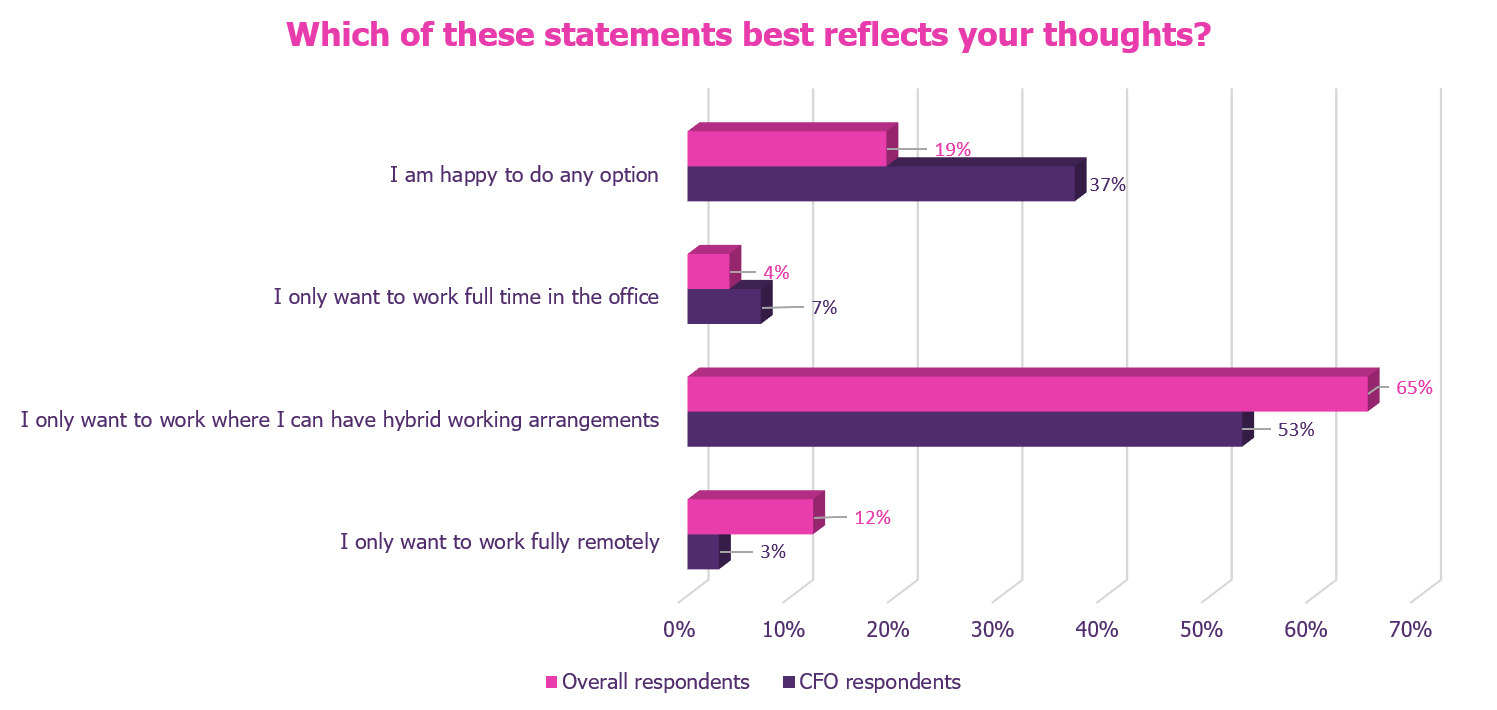
There are striking differences between the responses at the CFO/Finance Director level to working arrangements compared to the overall survey results.
- Only a quarter of CFOs/FDs wants to work remotely compared to the overall survey results (3% to 12%).
- Half of them want to work in a hybrid arrangement, compared to two-thirds of respondents in the overall survey (53% to 65%).
- Almost twice as many are happy to work in the office full-time (7% to 4%).
These differences do not surprise us, as the respondents at this level are decision-makers. Most want to have their teams back in the office, these findings are consistent with that.
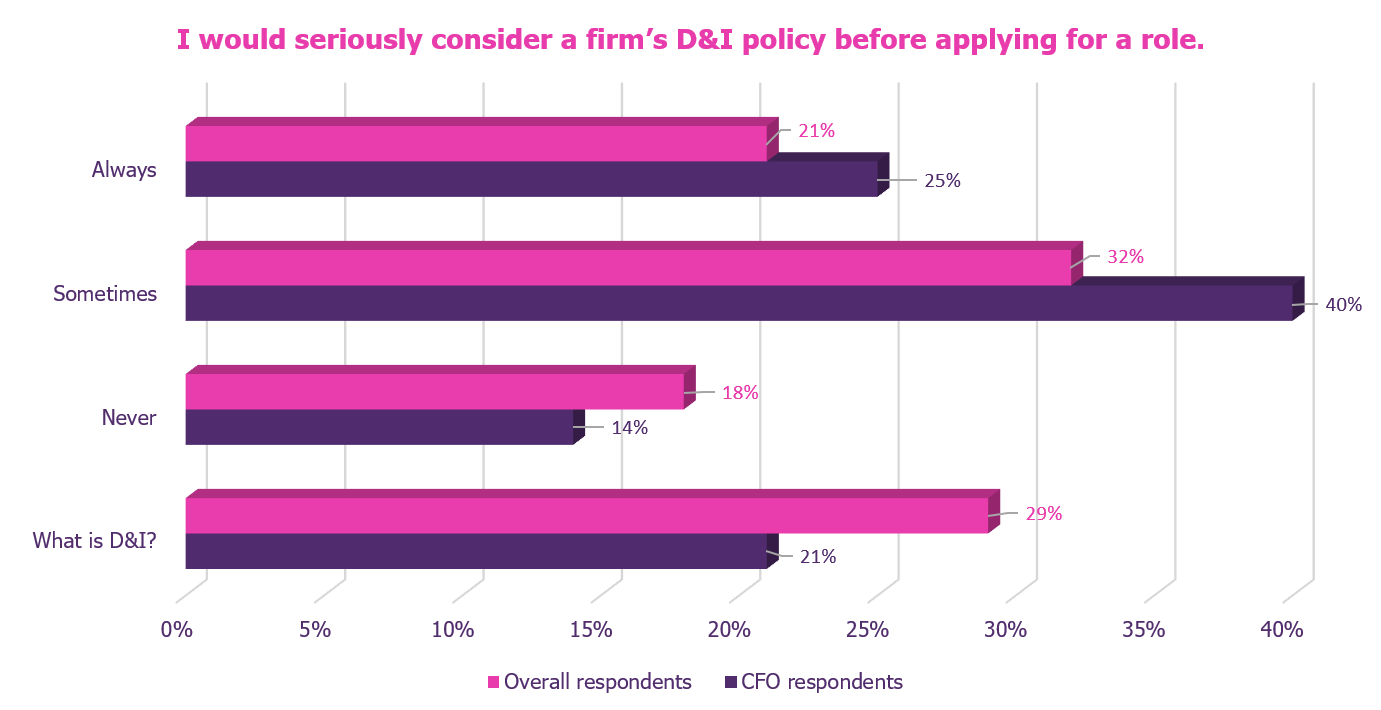
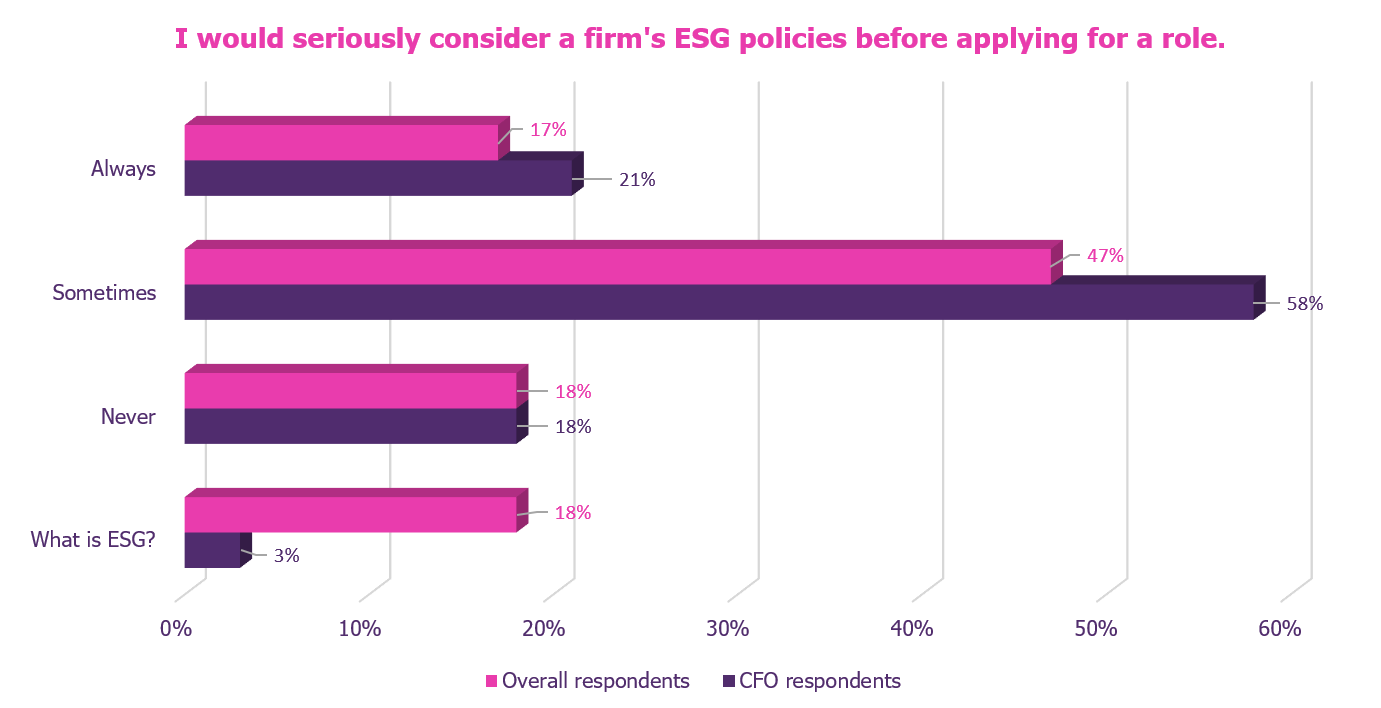
At the Finance Director/CFO level, it is no surprise that the respondents are well-tuned into both the D&I and ESG agendas. The awareness of both is significantly higher than the respondents in the overall survey.
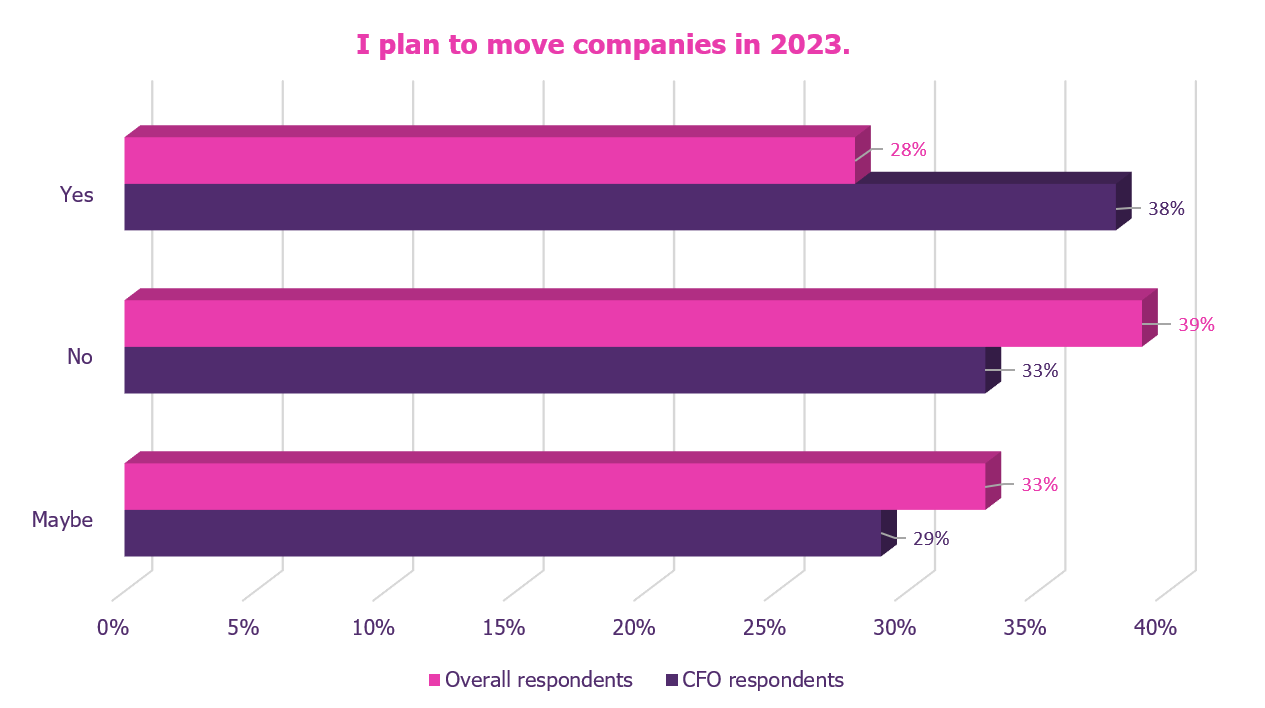
What is striking about the differences here at the CFO/FD level compared to the overall survey results, is that a third more of the candidates at this level are actively looking to move roles (38% to 28%).
This area of the market was busy in 2022, and there is more movement at this level than in previous years.
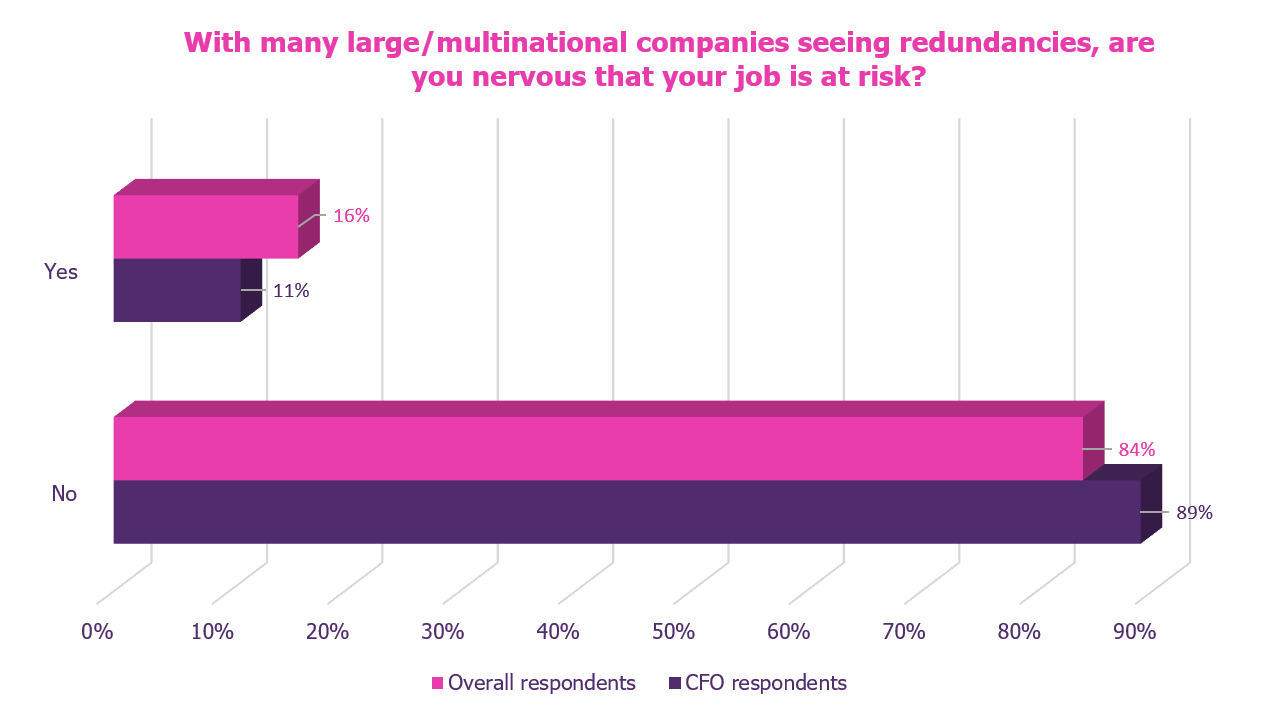
Interestingly the respondents at this level are more upbeat about their job security than the respondents in the overall survey. Nine out of ten of them feel the present changes in the tech. industry will not affect their job security.
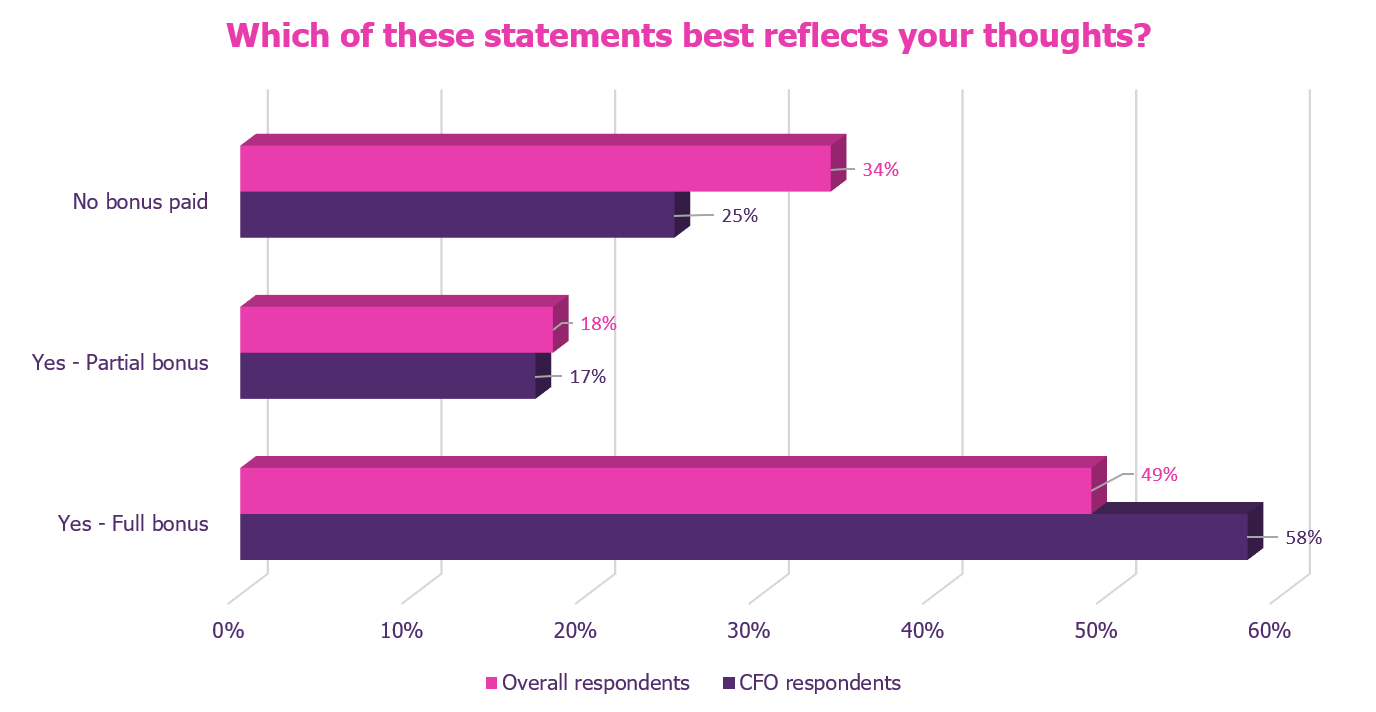
75% of respondents at the CFO/FD level got a bonus of some sort, compared to 67%of respondents from the overall survey.
A quarter of them got no bonus, compared to a third of the respondents overall, who got no bonus.

Financial Controller Market

2022 was a record year for The Panel placing finance talent, and the improved demand for senior finance professionals led to an increase in both salaries and in counteroffers. Candidates now have multiple offers to choose from at the end of their job search, yet many end up staying in their current roles after accepting lucrative counter offers.
At the FC level, the survey results were very much in line with those of the overall survey.
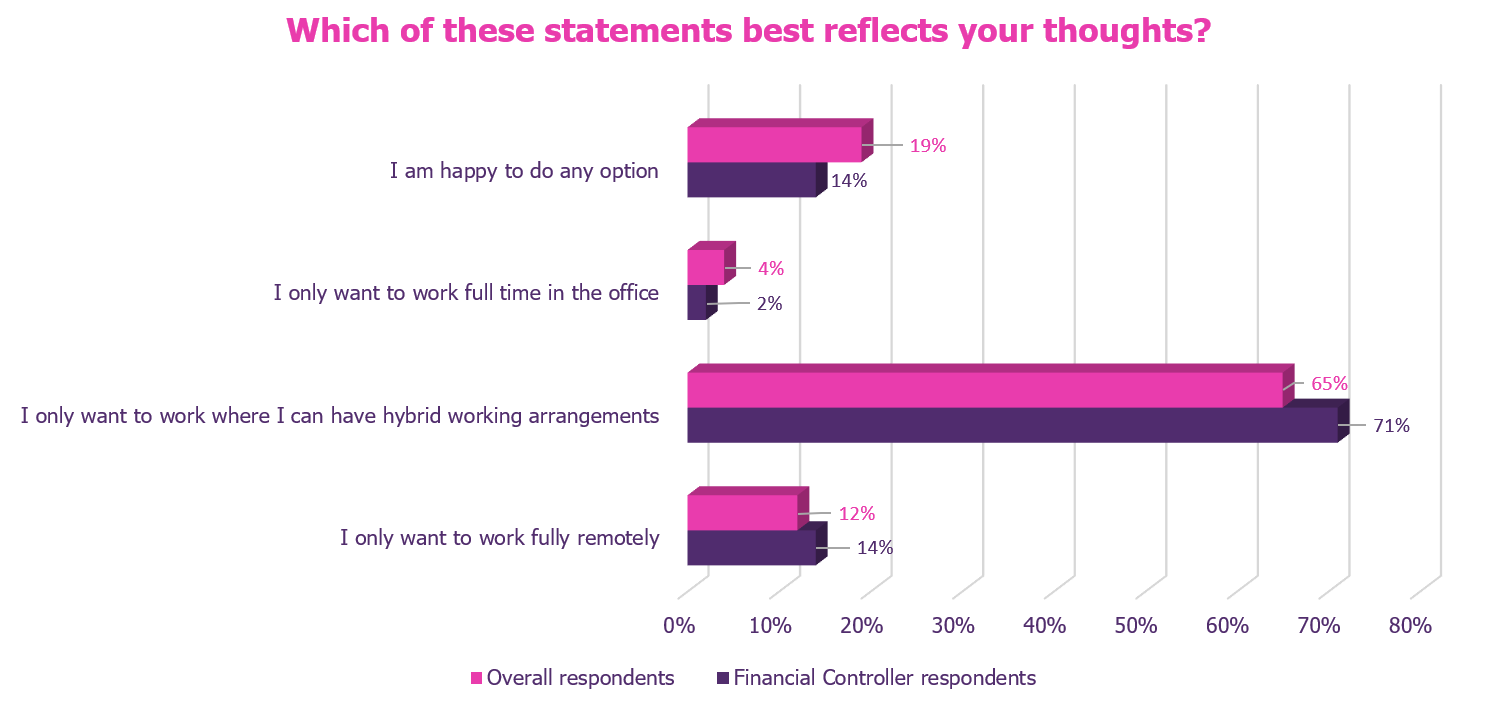
A higher percentage of respondents (14% to 12%) want to work entirely remotely at the Financial Controller level compared to the overall survey findings.
Interestingly 50% less (2% to 4%) chose to work in the office full time.
Working from home (WFH) remains a key selling point for companies, with the majority offering 2-3 days (WFH).
There can be a negative bias towards companies who require their staff on-site 4-5 days a week from a candidate’s point of view, who sees this as a reflection of their prospective employers’ company culture. Flexibility on your WFH policy will be vital in attracting candidates and retaining your existing staff.
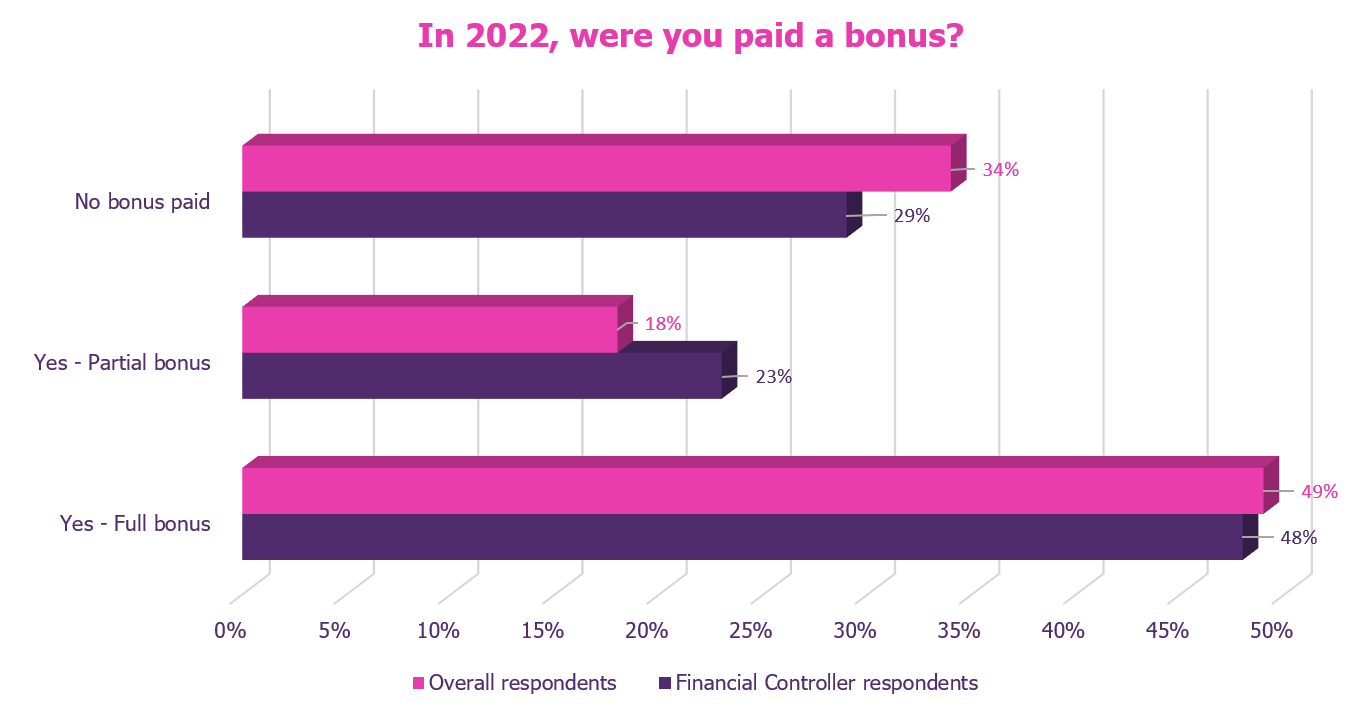
By marginal amount, (71% to 67%), respondents at this level got some type of bonus. This may be due to the fact that they have more influence on the awarding of bonuses.
The market is very much candidate driven at the moment. Companies who move quickly during the recruitment process are more likely to secure their preferred candidate. We also advise clients to keep in touch with their new starters before they commence.
Financial Services Market
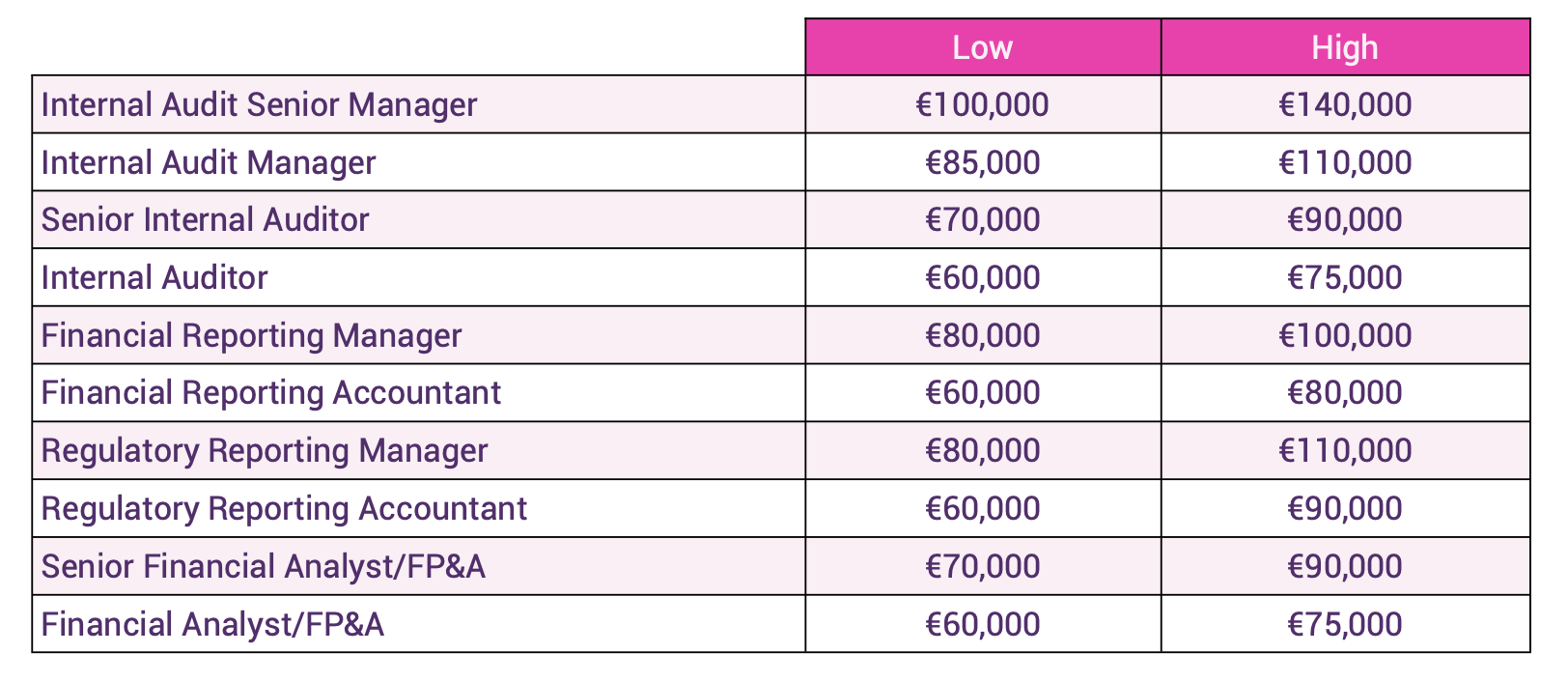
There has been strong demand for accountancy professionals across all levels within Financial Services, with the sector continuing to bounce back strongly from the pandemic and Ireland taking full advantage from the fallout of Brexit. With this, currently demand outweighs supply with skilled candidates across the finance field.
One clear development that has arisen in the past couple of years is the shift in candidates’ motivations to change roles. Yes, salary and job satisfaction continue to be key motivators, however, flexibility and work/life balance in the workplace are becoming even more of a priority as we began to see firms who don’t genuinely embrace this, lose staff more readily.
Retaining and attracting key talent going forward will require employers to have this as a key element and communicated from the first point of contact in the hiring process in a transparent and open manner.
In short, salary, bonus, and benefits are still top considerations, but the key differentiator for employers is flexibility and how they manage this going forward to retain and attract talent.

Newly Qualified Accountant Market
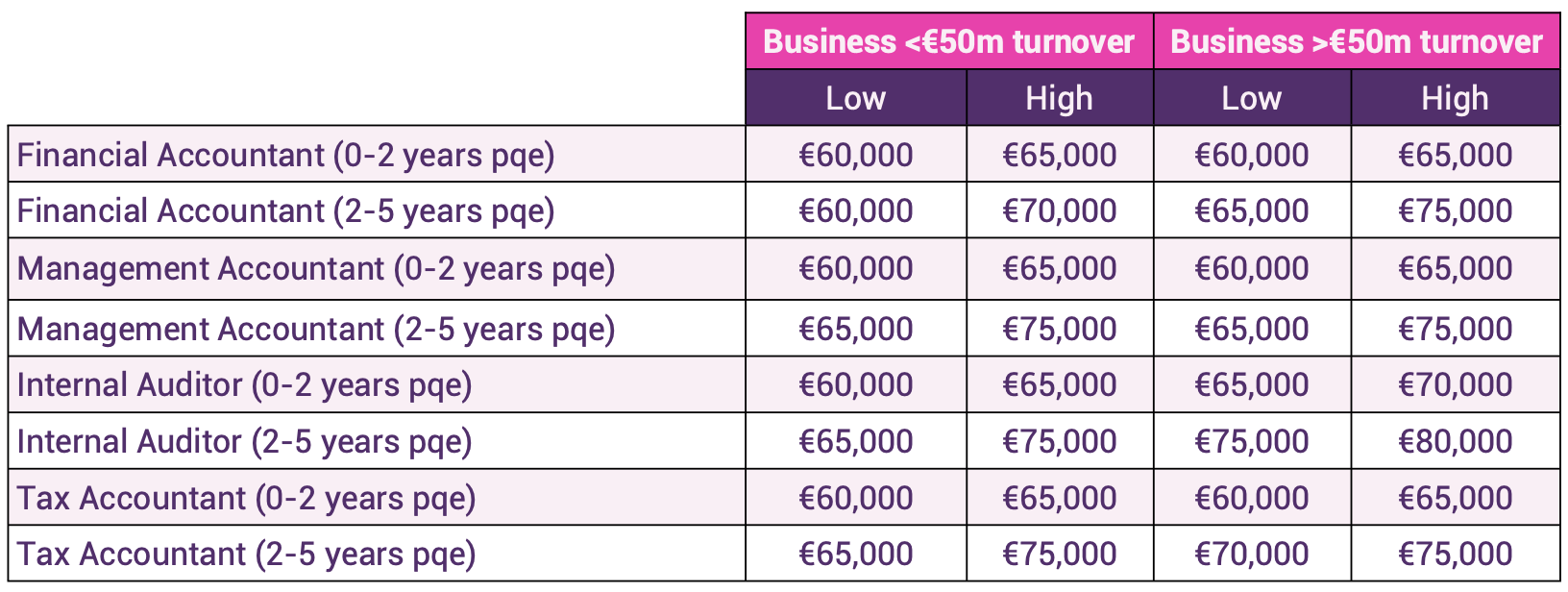
At the Financial Accountant/Finance Manager level, the survey results correlate very well with the overall survey, with a small number of exceptions.
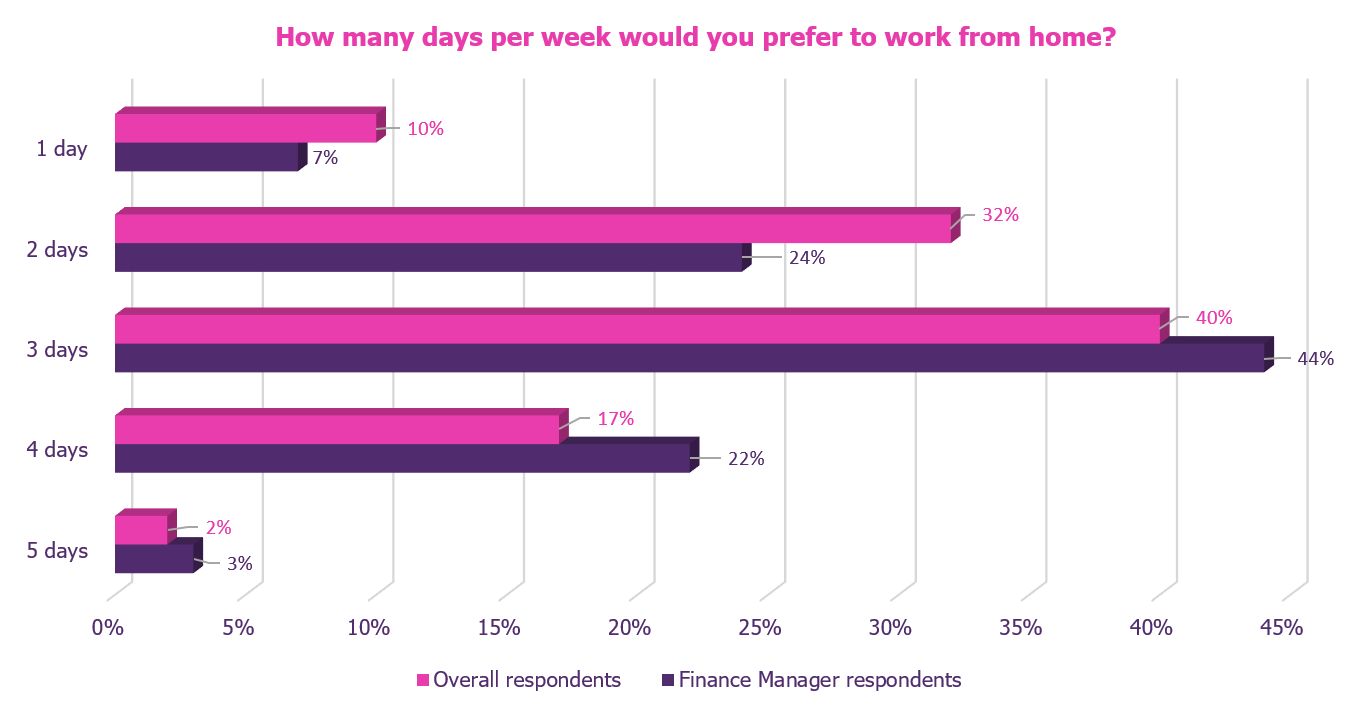
By and large, similar to the main survey results. 30% less of the respondents want to work one day from home compared to the main survey findings (7% to 10%). Overall, working two or three days from home is the most popular choice, consistent with the overall survey results.
Respondents at this level are slightly more optimistic regarding their career prospects in 2023 than the main survey results. 10% more (55% to 50%) are optimistic for the year ahead. Third fewer respondents (9% to 12%) feel that 2023 will be a difficult year career-wise.
Choice:
Of all experience levels, newly and recently qualified accountants are arguably in the most demand. This demand has seen salaries increase by over 10% at this level. With candidates having so many choices in the current market, “selling” the role is more critical than ever before.
Emphasising career opportunities, company culture and flexibility on WFH at the interview stage are significant considerations for candidates at this level, as is career planning.
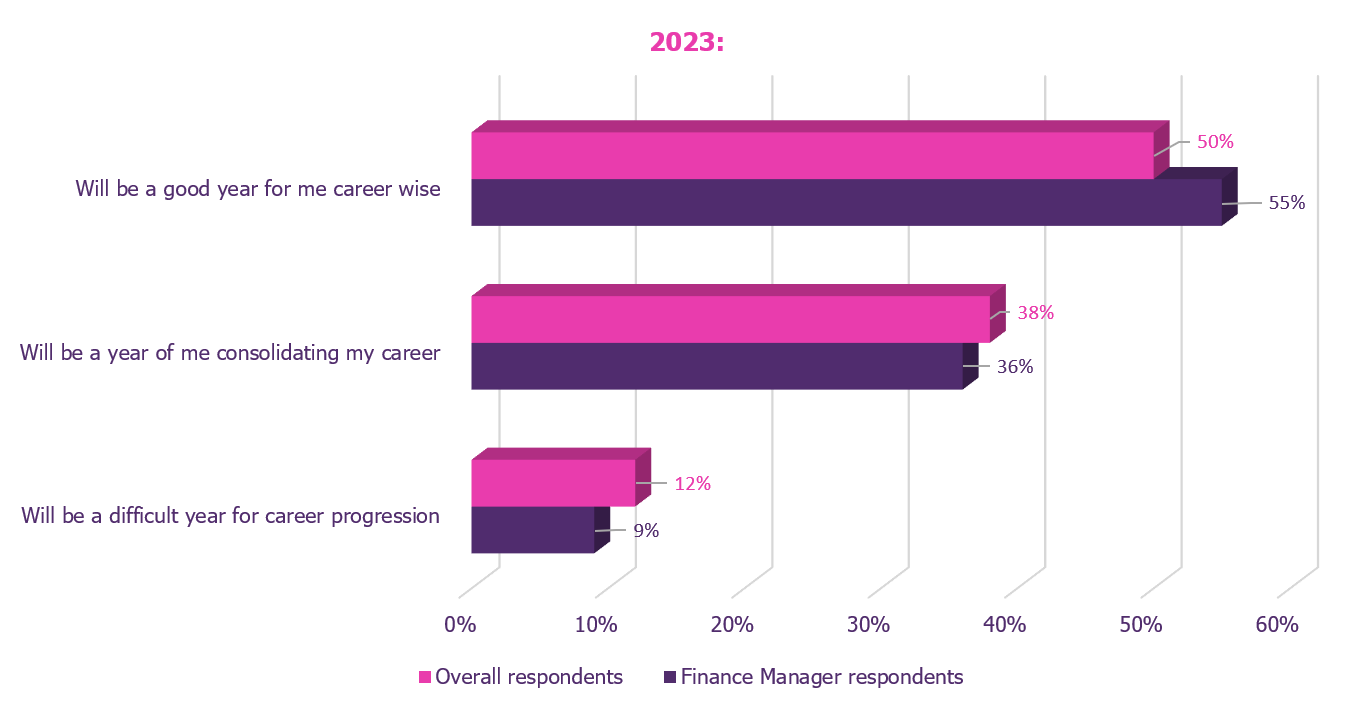
Respondents at this level are a bit more optimistic regarding their career prospects in 2023 than the main survey results. 10% more (55% to 50%) are optimistic for the year ahead. A third fewer respondent (9% to 12%) feel that 2023 will be a difficult year career-wise.
With COVID-19 and current high rental prices in Ireland, many candidates are now looking to take a working holiday to Australia or Canada, which further tightens the talent pool in this case.
With this demand, candidates may have several options/offers at any time; therefore, an efficient inter- view process and clarity on timelines/feedback are essential. Candidates withdrawing from recruitment processes because the interview process is too elongated, has noticeably increased.
WFH/Hybrid:
Clients embracing hybrid teams benefit from a wider talent pool and higher employee morale. Along with having a significant advantage in hiring, it will aid the employer in retaining top talent. For most candidates, having some flexibility on WFH has become a non-negotiable.

Accounts Staff Market
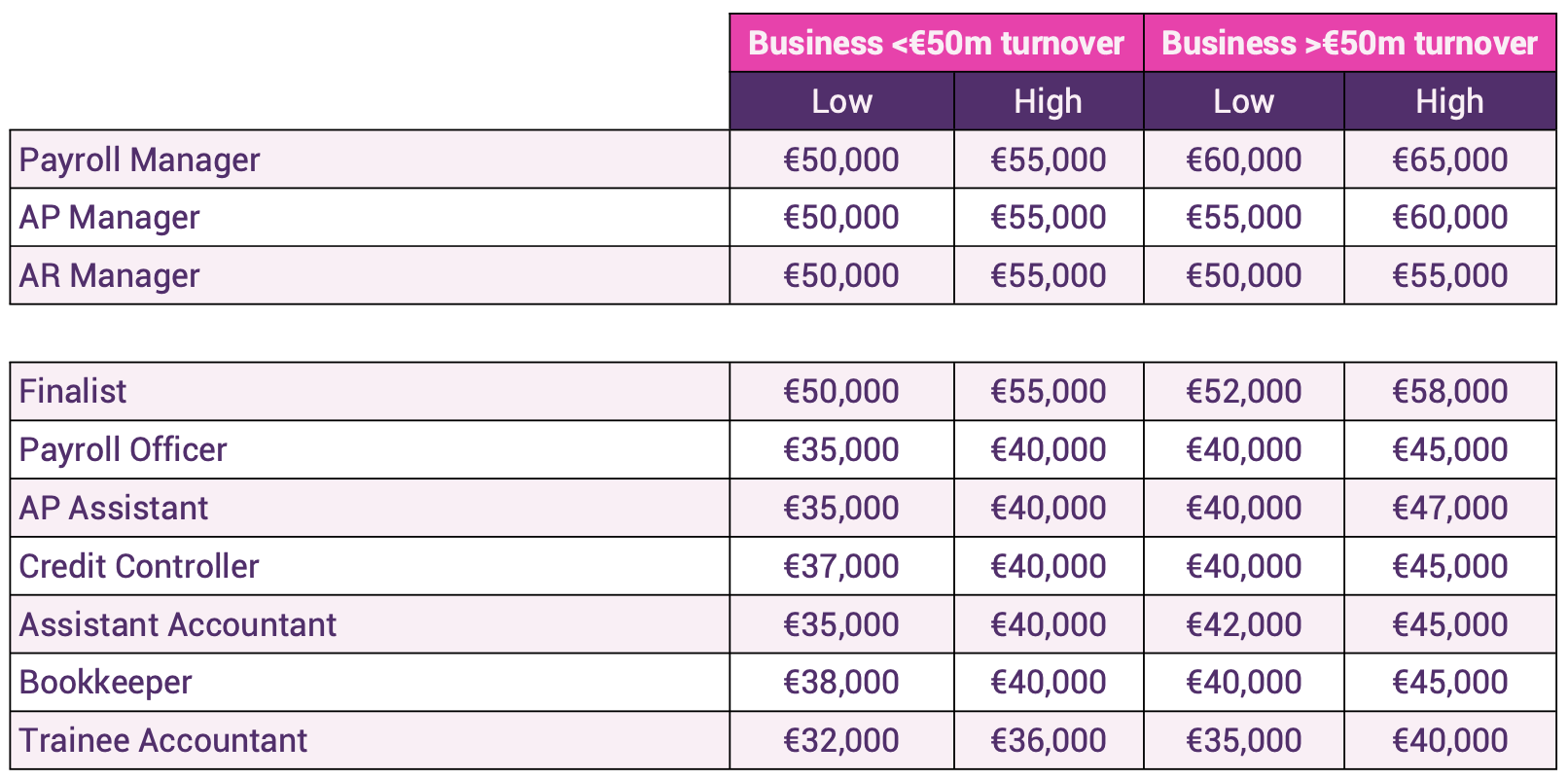
Choice:
At the accounts staff level, and with continued growth in the market, there has been a noticeable in- crease in demand for part-qualified accountants, accounts payable, and assistant accountant roles. With this demand, salary levels have risen steadily, with increases of 10% or more over the last year.
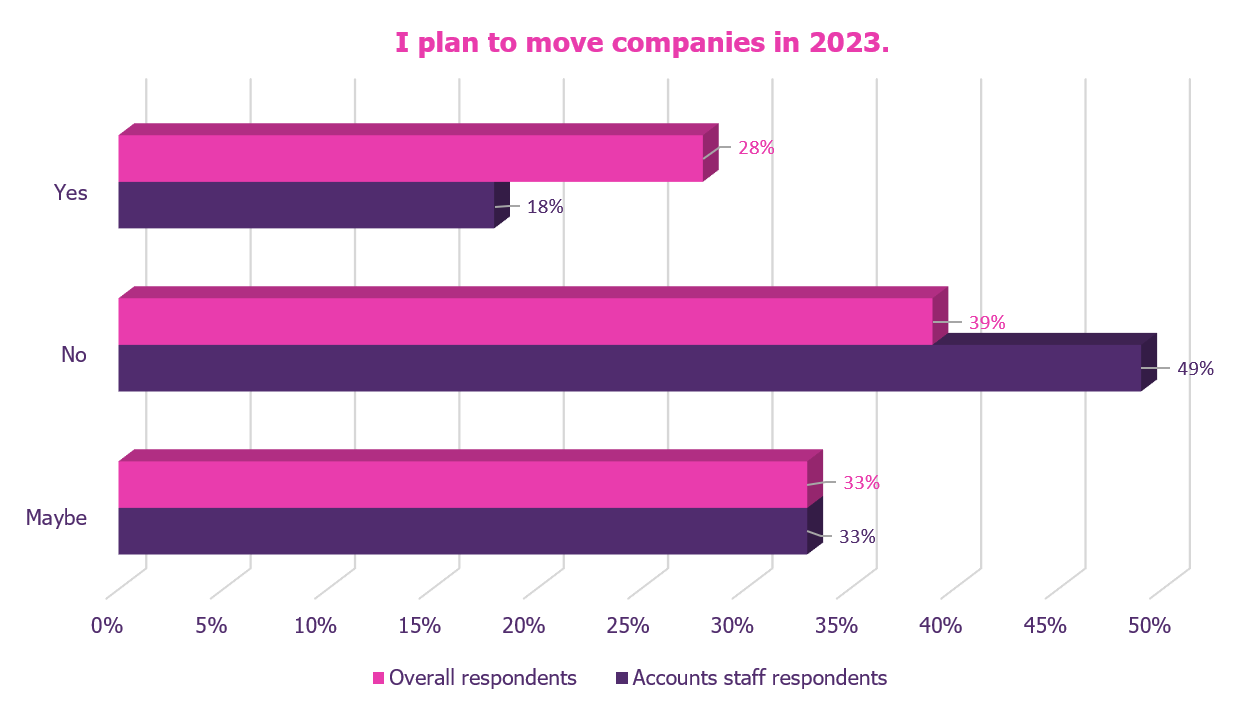
Less than one in five of the accounting staff/part-qualified accountants surveyed are looking to move in 2023, with half of them definitely staying put. This is lower than the 28% of respondents looking to move from the overall survey.
Salary, career progression and work/life balance are the main reasons given at this level for people looking to move.
Other considerations are also proving to be important at this level, such as WFH options, pension and health contributions, and career progression opportunities once qualified. Clients must have clarity on career potential and WFH policy at the interview stage. A reasonably quick interview process has become essential, as candidates often have several interviews/offers in motion at any one time.
Any unreasonable delay may put a suitable candidate off the position and cause clients to lose out on the best talent.

What is interesting about candidates at this level is that half of the respondents do not seem to know what ESG is. On our overall survey, that figure is 18%.
Similarly, on the D&I question, half of the respondents were unaware of D&I. On the overall survey, that figure is 29%.
It seems to point out that either there is a lack of education and/or a lack of interest in these topics at the accounts staff level.
WFH/Hybrid:
Most candidates at this level accept that as they join a company/new team, being on-site can be more beneficial and productive for initial training and team cohesion. However, beyond this onboarding stage, most candidates seek a hybrid work model. From our experience, clients requesting employees to be on-site full-time are severely restricting the talent pool to source from. A ratio of 3:2 Work:Home became the most common breakdown by the end of 2022. This is still very much an area where employers are expected to be flexible.

Corporate Treasury Market
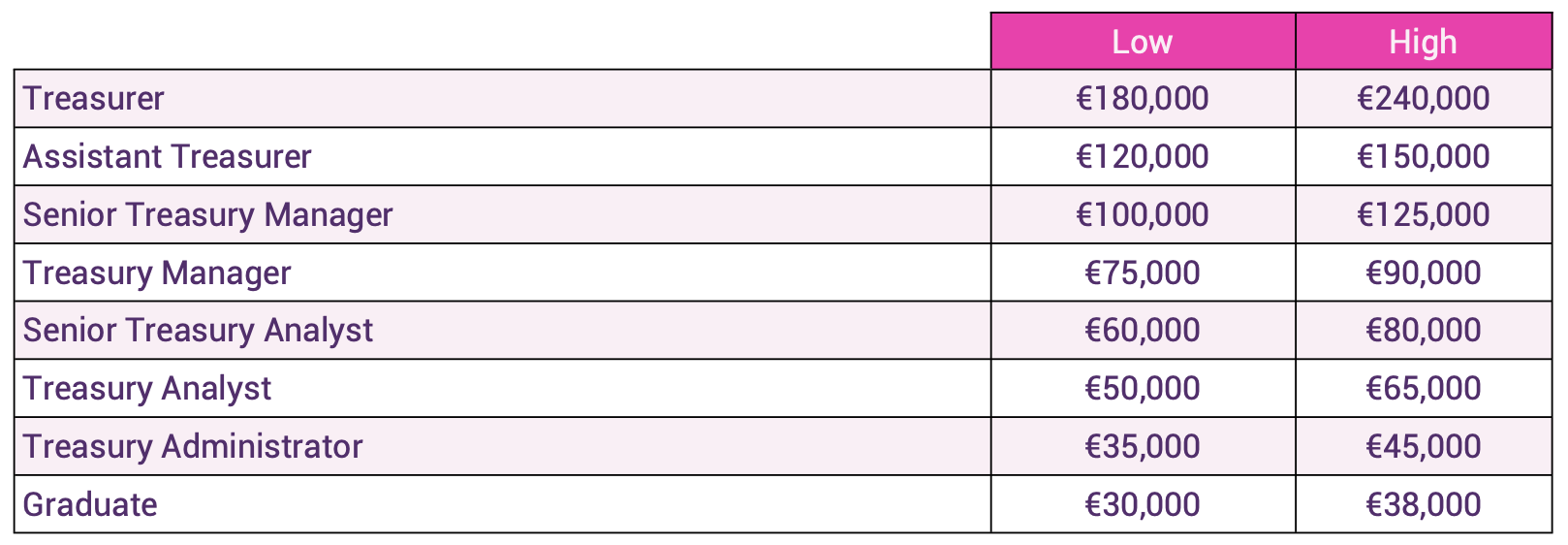
Choice:
Recruitment within corporate treasury in Ireland was extremely buoyant throughout 2022 and this was across multinational treasury centres, shared service centres and within traditional Irish plcs.
There was some uptick in staff turnover as a rebound to the reduction in turnover during 2020 and early 2021 as a result of Covid. In addition to this many treasuries expanded and needed additional headcount, while demand for staff was also higher due to he opening of a number of new treasury operations in Ireland.
Demand has been heaviest at Treasury Analyst level up to Treasury Manager, with only sporadic vacancies at the Assistant Treasurer and Treasurer levels. Employers within treasury are increasingly seeking project experience and strong TMS exposure, with systems implementation experience particularly appreciated.
WFH/Hybrid:
Hybrid working is now the norm and the first questions every candidate asks is what a company’s WFM policy is. The norm has settled on 3 days in the office and 2 days WFH, and we do not expect this to change much in the next few years. Most importantly there has been heavy upward pressure on salaries over the last 12 months, especially at the more junior end.
We think salary pressure has come about as a result of the combination of poor salary rises since 2018, heavy inflation pressure effecting every employee’s cost of living and finally a shortage of skilled treasury staff.

Benefits package:
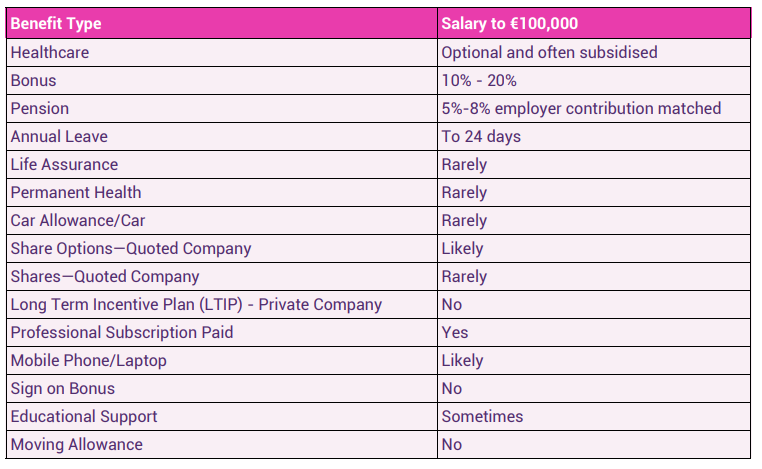
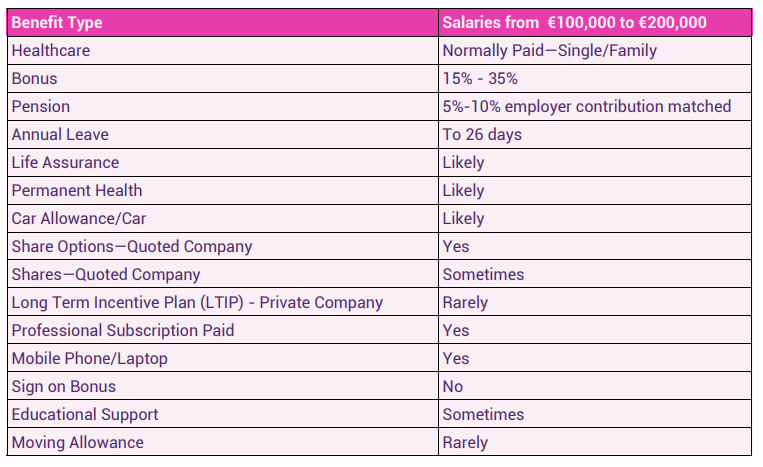
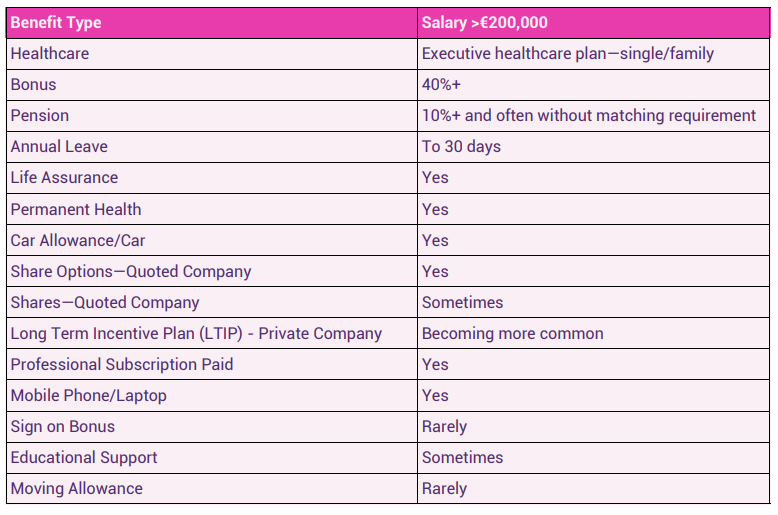
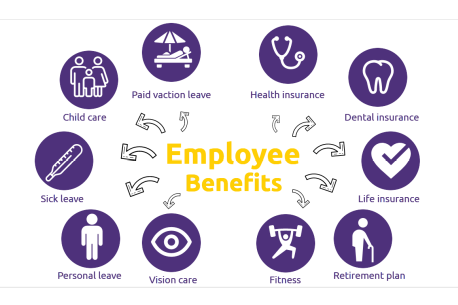
Share options and LTIPs normally have a vesting period in place.
- A private company can use an LTIP to incentivise their “C” suite without giving equity.
- Increasing paid holidays is common for clients to sweeten a salary package.
- Some clients give a fixed amount to their employees in addition to base salary – a flexible benefits package, which they can spend in any way they want to.
The Panel
Sustainability
As time moves on the sustainable responsibility of employers are becoming more and more important, therefore we here at The Panel take great pride in doing our best in meeting our target in this area. We take responsibility for our candi- dates, clients, and every part of our business in order to offer and supply solutions that positively impact those around us.
Knowing that you are partnering with a responsible organisation, should offer you peace of mind.
Read more on our Sustainability Policy here.

Diversity & Inclusion
In The Panel we actively focus on sourcing talent through a D&I lens – we know diverse teams make for better functioning and more collaborative teams.
The Panel and our Managing Partner Anne Keys were instrumental in the setup and launch of 100 Women in Finance in Ireland in 2017 and Anne is currently acting as the Co-Chair for 100 Women In Finance Dublin.
Anne organises and hosts iNED workshops for women. Attendees include C-suite executives considering a career as an iNED and for women who have just moved into this space.
In November 2017, The Panel signed up to the Ibec/30% Club’s “Voluntary Code of Conduct for Recruitment and Executive Search Firms Code”.
This Code recognises the importance of search firms and client organisations working together to deliver change based on four principles:
- Strategy & Goals
- Talent Pipeline
- Prices
- Monitoring & Reporting
What can The Panel help you with?
Regulations – guiding candidates and clients through the Irish regulatory environment.
Market analysis – updating candidates and clients on current trends.
Talent acquisition – for clients we help source the best candidates for the role at hand.
Advice – we provide our candidates and clients with the most up-to-date information available regarding the market, the recruitment processes and the best remunerative options available to both.
Technology & Resources – offering candidates and clients the most up to date in recruitment and AI technology, enabling a quicker and more efficient recruitment process from start to finish.
Diversity & Inclusion at The Panel
As a company The Panel has successfully strived for internal diversity and inclusivity and in doing so we firmly believe that puts us in a strong position to be ambassadors for our clients in an Ireland that is becoming ever more progressive, diverse and inclusive.
- We support groups for women in business e.g. 100 Women in Finance & Women Executives.
- We employ 11 different nationalities with various cultural and religious beliefs.
- We have a higher proportion of female employees.
- We have two joint MD’s at the Panel, 1 male and 1 female.
We believe we are one of the most diverse and inclusive recruitment companies in Ireland, putting us in a position to help our clients achieve the same.
We instil the following approach through rigorous training of our employees;
- Equal Employment Opportunity is a fundamental right of all employees and applicants for employment.
- The Panel undertakes not to discriminate unfairly against any applicant in respect of the subject matter of
disclosures made pursuant to the pre-engagement screening process or any other information revealed
during the engagement process. - All applicants are provided a full and fair opportunity for employment, without regard to race, colour,
religion, national origin, disability, gender, age, sexual orientation, genetic information or parental status - We promote equality for all candidates.
- We foster and support a globally diverse and inclusive workforce with our clients and place a high value on
diversity and equal opportunity. - We believe it is important for applicants to be considered for the employment of their choice and have the
chance to perform to their maximum potential. - The Panel is an equal opportunity Employer and Recruiter.




